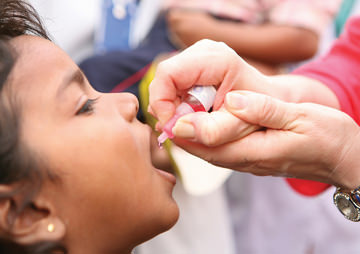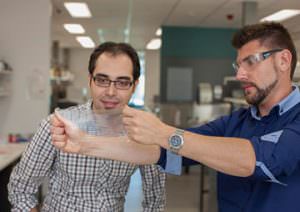Bill Gates Worries Pakistan Violence Blocks Polio Eradication, but Is CIA Partly to Blame?
The Bill and Melinda Gates Foundation has done an amazing job in targeting diseases for eradication, and the world is very close to getting rid of polio altogether, in part because the Gateses in recent years have given their support to the effort, which began in 1988. RIBI Image Library (CC BY 2.0)
RIBI Image Library (CC BY 2.0)
This post originally ran on Juan Cole’s Web page.
The Bill and Melinda Gates Foundation has done an amazing job in targeting diseases for eradication, and the world is very close to getting rid of polio altogether, in part because the Gateses in recent years have given their support to the effort, which began in 1988. Cases have fallen 99% since then.
Bill Gates worried yesterday in an interview with AFP, however, that violence in Pakistan and Nigeria would interfere with the goal of wiping the disease out by 2018.
“Nigeria and Pakistan are going to be tough. The Pakistan violence is evil,” he said, according to AFP.
Unfortunately, as the Scientific American explains, the problem of Taliban violence against vaccination workers in Pakistan was exacerbated by the US Central Intelligence Agency, which in its search for Usama Bin Laden in the northern Pakistani city of Abbotabad used agents falsely pretending to be vaccinating against Hepatitis B. The ploy failed, but news of it reached the Taliban.
There are only a few dozen cases a year of polio in each of Nigeria and Pakistan now, and these two along with Afghanistan are the last places on earth there are still regular reports of polio cases. The last case in India was reported in 2011. There are occasional cases in other countries because of international travel, but these have been quickly and successfully contained in recent years.
On Tuesday, three polio vaccination workers were gunned down by extremists in eastern Karachi, Pakistan’s largest city. The vaccination drive has been halted by the Sindh provincial government carrying it out, as a result.
Also yesterday, the World Health Organization warned that the northern Pakistani city of Peshawar is now the largest reservoir of polio in the world, with 91 infections last year, up from 58 the year before. Polio can paralyze or kill its victims only hours after it is contracted. There were 30 attacks on polio vaccination workers in 2013.
Intelligence work involves what is called tradecraft, i.e. various forms of trickery. In the murky world of such information gathering, ethics are often sacrificed (indeed, trickery is itself in most ways unethical). The only argument for some forms of tradecraft is that the trickery is being carried out to protect people.
But where operatives deploy tradecraft that interferes with the eradication of a major scourge of humankind, they clearly have stepped over a line. It should be US government policy that the CIA will never again be allowed to impersonate vaccination workers. Otherwise the 3000 who died on September 11, 2001, will be overshadowed by those dead in preventable epidemics of the future.
At a time when the US is grappling with all the dirty tricks played by the National Security Agency with regard to electronic surveillance, it is important to remember that unethical operatives have sometimes acted in rash and foolhardy ways that have produced more harm than good. Bill Gates is perfectly correct that Taliban violence in Pakistan, which often targets non-combatants, is evil. But the evil has been compounded by unwise false flag tradecraft on the part of out of control operatives who were working for the executive branch of the US government.
Your support is crucial…
With an uncertain future and a new administration casting doubt on press freedoms, the danger is clear: The truth is at risk.
Now is the time to give. Your tax-deductible support allows us to dig deeper, delivering fearless investigative reporting and analysis that exposes what’s really happening — without compromise.
Stand with our courageous journalists. Donate today to protect a free press, uphold democracy and unearth untold stories.


You need to be a supporter to comment.
There are currently no responses to this article.
Be the first to respond.